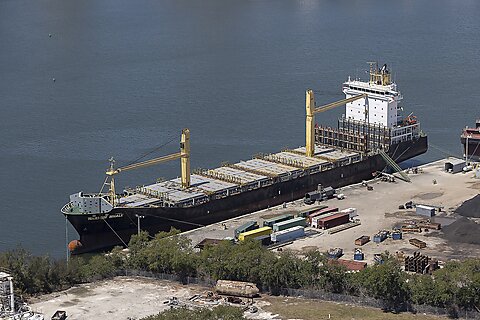Colin Grabow
The George II is a case study in Jones Act dysfunction. Delivered in December 1980 by a now‐defunct Louisiana shipyard, the forty‐three‐year‐old containership—long in the tooth even by the standard of ships operating under the 1920 law—would normally have been recycled long ago. Internationally such vessels are sent to shipbreakers at an average age of approximately twenty‐seven. But thanks to shipping protectionism and Chinese shipyards that help maintain aging vessels of the US domestic fleet—including the George II—the ship will almost certainly keep operating for years to come.
It’s an outcome that makes sense neither from the viewpoint of economics nor national security.
That foreign ships are more frequently scrapped and replaced with new vessels is a matter of simple economics. Ships become more expensive to maintain and operate as they age. At a certain point—typically after age twenty, although sometimes even earlier—the math favors selling the ship for scrap value and purchasing a newer, more efficient one.
Jones Act ships, however, face a more different calculus. While internationally‐flagged ships can be bought from overseas shipyards, the 1920 Jones Act requires that vessels engaged in domestic commerce be constructed in the United States. The cost difference is enormous.
In 2022, for example, three 3,600 TEU containerships were ordered from a US shipyard for $333 million each. The previous year, meanwhile, the going price for an even larger (4,250 TEU) containership from a foreign shipyard was $65.5 million.
These costs are a significant deterrent to fleet modernization. As the then‐CEO of a Jones Act shipping company stated in a 2005 interview, “As a result of [the relatively high cost of building vessels in the US], the vessels in Jones Act markets…are quite old.” Recently another Jones Act CEO stated that while tankers from the international fleet are typically used for 20–25 years, those in the Jones Act fleet typically have lifespans of 30–40 years.
The last seventeen ships removed from the Jones Act fleet had an average age of forty‐three.
Which brings us back to the George II. Rather than scrap the ship, owner Pasha Hawaii opted to perform extensive upgrades, including the installation of a liquified natural gas (LNG) fuel system that will ensure the vessel’s compliance with international emissions rules. That certainly was not cheap. Although a dollar figure has not been made public, Jones Act shipping company Matson has disclosed that upgrading its twenty‐year‐old containership Manukai to run on LNG will cost the company approximately $60 million.
For perspective, two slightly smaller brand‐new containerships (1,450 TEUs versus 2,378 TEUs for the Manukai) with LNG fuel systems were ordered last year from an overseas shipyard for $49 million each. That may make the Manukai’s LNG upgrade seem relatively expensive, but it’s less than one‐third the price of building a similar‐sized containership in a US shipyard.
So, old ships keep sailing.
A further wrinkle to this story is where these ship overhauls are taking place. While both Pasha Hawaii and Matson are board members of the American Maritime Partnership, a Jones Act advocacy group that portrays the law as a bulwark against China, both companies rely on the country’s shipyards to maintain and upgrade their vessels. Indeed, in 2019 Matson officials gathered in Nantong, China to celebrate the company’s 50th ship repair at the state‐owned COSCO shipyard. The Manukai is in Nantong right now for its LNG overhaul, while the George II departed the same shipyard after its upgrade earlier this month.
In other words, Jones Act shipping firms repair their vessels in low‐cost Chinese shipyards and then use the savings to advocate for a law that prevents using shipyards in allied countries to expand and modernize the US domestic fleet. All in the name of stopping China.
The policy failure is multifold. First, the use of older vessels that are costly to upgrade and maintain contributes to elevated shipping costs that are passed along to consumers. Second, the presence of aging ships undermines the Jones Act fleet’s already limited military utility. Indeed, the primary subsidy program used to ensure commercial ships are available to the military prohibits ships over twenty‐five years of age. Third, the use of old vessels boosts demand for repair services in shipyards owned by the government of China, the very country Jones Act supporters contend the United States must maintain vigilance against.
As a rent‐seeking exercise, the Jones Act performs brilliantly. As a means of meeting US economic and national security needs, however, the law is a self‐inflicted wound.

